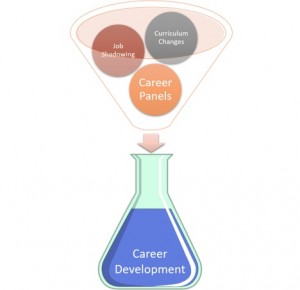By: Tomas Kasza
You have probably read this next bit of information before. Graduate student scientists are trained for an academic career while the number of academic positions are shrinking. An increasing number of PhD graduates are choosing to pursue careers that require a PhD but, paradoxically, lack the skill set to complete those jobs. In response, the National Institute of Health (NIH) and the National Endowment of the Humanities (NEH) are seeking to change graduate education through two different approaches.
The NIH started the Broadening Experiences in Scientific Training (BEST) grant with the goal of, “conducting a series of experiments to identify new and innovative approaches to broaden career and professional development for graduate and postdoctoral training.” These experiments include three different participation models for institutions: Cohort, which utilizes team building and peer-to-peer mentoring, Broad Exposure, all scientists are welcome to all activities, and Alumni Mentoring, which focuses on alumni serving as mentors for BEST scientists. Rutgers iJOBs is part of the Alumni Mentoring model with a, “Special emphasis on career-specific alumni serving as mentors for BEST scientists.” The key word here is “participation.” Students must be the ones to take initiative by attending career seminars, visiting employer sites, and constructing their own curriculum development.
Alternatively, the NEH, the government funding body that funds humanities research, created the Next Generation PhD Implementation grant and the Next Generation PhD Planning grant with the intention of revolutionizing American PhD programs in the humanities. Through these grants, doctoral students, “Will be prepared to undertake various kinds of careers,” similarly to the BEST grant. Unlike the BEST grant, however, Next Generation Grants intend to, “Assist universities in implementing a new model of doctoral education [to] increase their relevance for the twenty-first century.” These grants will accomplish this through, “transformations in curricula, modifications in stipend structures, altered formats for dissertations, commitment to collection of alumni career information and outcomes, partnerships with non-university entities, as well as a pledge to encourage doctoral students to explore and prepare for multiple career trajectories.” This momentous change of the entire humanities doctoral education system, which encompasses everything from geography, linguistics and languages, music, and history, is an ambitious goal. The NEH’s approach to improving graduate training is different because it adapts curricula and dissertation formats to promote career development.
Which approach is better? As these are new initiatives, that remains to be discovered. Requiring student initiative can prepare trainees for a transition to self-motivated career development. On the other hand, having clear career development structure could save the student the time of discovering each career option and aid in internship and mentoring opportunities. The independent nature of each graduate program can create unique approaches to tailor graduate education to a career field. The unique nature of every PhD experience and the individuality of every student will further obfuscate the determination of which approach is best. The traditional PhD is changing but has not finished materializing.
